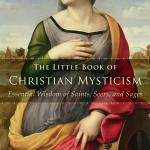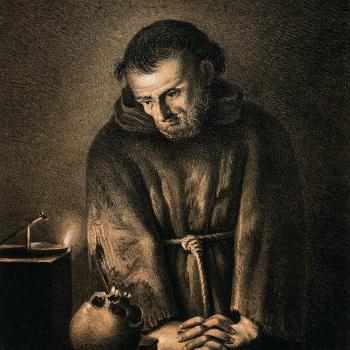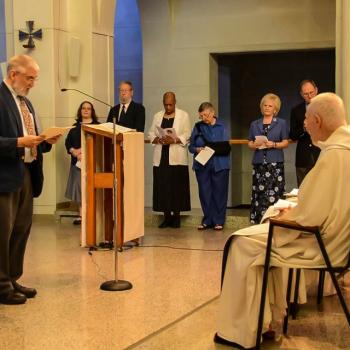Today’s guest contributor is Jon M. Sweeney, author of The Saint Francis Holy Fool Prayer Book. Read Jon’s previous post on Saint Francis here: What Do Gene Kelly and St. Francis Have in Common?
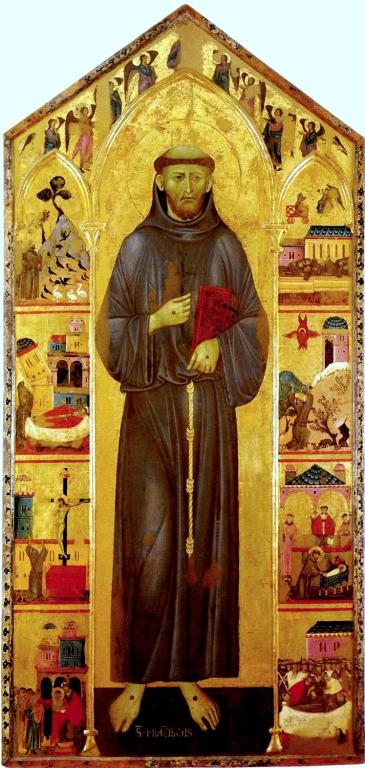
What a Fool Francis Was.
When Francis of Assisi acted like a fool 800 years ago, they called him pazzo. That’s Italian for crazy. So we can’t avoid terms like “crazy” and “dumb” – words that make us understandably uncomfortable – when talking about holy fools.
See my previous post, in which I told the story of my daughter disliking Singing in the Rain because Gene Kelly was being “dumb.”
The adjective actually made Francis quite happy. He knew if folks call you “crazy” or a “fool,” you must be doing something right.
The foolishness of Francis’s life and actions is difficult to explain if you use only rational or pragmatic ways of understanding:
- Like when he stripped naked in front of a crowd in order to give everything in the world that belonged to his father back to him.
- Or when he began preaching to birds after people didn’t seem to pay much heed to his words.
- Or when he scolded some of those birds for not listening carefully enough and chirping too loudly during Mass.
- Or when he joined a friend in deliberately humiliating himself—Francis had punished the friend by holy obedience (he was, by then, the friend’s religious superior) for refusing to preach the Gospel. The punishment was for him to go and preach in his underwear. A few minutes later, Francis chastised himself for being too severe on his friend, and repented by stripping down himself and joining him in the pulpit.
Why would someone do these things? They don’t exactly make sense, do they? And yet, somehow, they did, and do.
When Francis, Brother Juniper, and other early Franciscans were becoming fools for Christ, there were also professional fools that hired in noble and royal courts, or traveling from town to town, that were entertainers and truth-tellers. They were thought to possess a wisdom that came of being detached from normal ways of the world. They never stopped reminding their audiences that the world will lie to you, deceive you with false appearances; that the world may seem rational but actually it is mad.
You see such a troupe in Shakespeare’s Hamlet, for instance (act 5, scene 1); they are the grave diggers who appear after Ophelia’s suicide, bantering about death, love, and the meaning of life.
It was often the hired fool, dressed in motley silliness, juggling and telling stories, who was allowed to make jokes at the expense of the mighty. A common person wouldn’t dare say things that a fool could say with impunity. A fool flouted conventions, poked fun at niceties, and got away with it because he was feebleminded—either by pretense, or in reality. They were often regarded as medieval prophets, able to see or understand things that others couldn’t.
Francis and Juniper appreciated these fools and emulated them when they became, as Francis himself put it, “Jugglers for God.”
Fools Know the Truth
They would entertain crowds before they’d preach. They would sing and dance in such a ways that people sometimes thought they were drunk. The early Franciscans gained more followers to the way of Jesus than any spiritual movement ever had before.
They knew that the trouble with the world isn’t that the world is bad, but that we allow the world to tell us who we ought to be. A fool knows that the Gospel is alternative, not mainstream.
Remember the Beatitudes? How many people do you know who go seeking meekness, hunger, and peace instead of influence, satiety, and power? Francis and Juniper and the others were all about reminding people that following Jesus meant upholding alternative values, and how it’s nearly impossible to uphold them by being “normal” (another word that makes us uncomfortable) in a world committed to things as they are.
Those who know the truth sometimes have to be fools in order to communicate it. This is why the prophet Isaiah walked naked and barefoot for years (Isaiah 20), why the prophet Hosea married a harlot in order to make a point about faithfulness (Hosea 1), and why Jeremiah smashed a clay pot when God told him to forcefully make a point (Jeremiah 19). These are examples of being foolish to capture attention—or to subvert established authority.
Neither Isaiah nor Hosea cared a wit about their reputations. They cared, instead, about changing minds. Likewise, for Francis and Juniper, being a fool was not only a way of discipleship, but an act of protest. They wanted people to see the truth, and sometimes we wear such thick blinders that we need to be startled to attention before we can see through them.
An example from the life of Brother Juniper
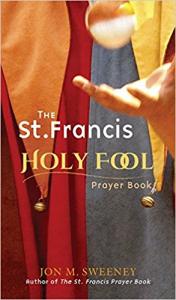 This is the sort of thing they would do…
This is the sort of thing they would do…
After Juniper’s reputation had become well-known for holy deeds, there came a time when he needed to travel to Rome. There were Romans who knew Juniper was coming to their city and they wanted to go out to meet him.
When Juniper saw them on the road ahead, he wanted none of their devotion. He began to ponder how to turn their expectations, and this greeting, around.
Then Juniper saw two boys playing on a seesaw, which they’d made by setting a board of wood over the top of a log. Juniper asked the boys if he could join in their play. Soon, Juniper’s arms were in the air and he was laughing like a child.
The crowd of expectant Romans saw this and they began to come closer. They wanted to take Juniper into the city, to honor him, and show him where a man of holiness could lie down and rest after such a journey.
But Juniper kept on playing. The people were gobsmacked.
As Juniper laughed and waved his arms, the people were trying to reverence and greet him as the holy man they knew he was supposed to be. But Juniper wanted to turn their reverencing into mocking and scorn.
“He’s a fool,” one of the Romans finally said. Others were not sure. But, as Juniper kept on playing with the boys on the seesaw rather than listening to the crowd that had come to greet him, the Romans slowly wandered away disappointed. It was only then that Juniper stopped seesawing and made his way, quietly, on his own, to the friary in Rome.
Stories like this reveal a side of the spiritual life we don’t often see today: how foolishness can reveal the authentic, mystical heart of faith in ways that the world cannot comprehend.
Celebrate more of Saint Francis’s tomfoolery by reading The Saint Francis Holy Fool Prayer Book.
Enjoy reading this blog?
Click here to become a patron.
Stay in touch! Connect with Carl McColman on Facebook:




